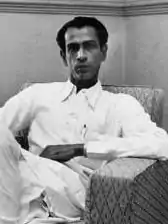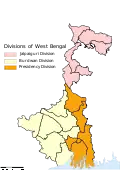Hare Krishna Konar
Hare Krishna Konar (1915–1974) was a fire brand politician, belonging to the Communist Party of India (Marxist), who played a major role in land reforms in the Indian state of West Bengal.[1]
Harekrishna Konar | |
|---|---|
হরেকৃষ্ণ কোনার | |
 | |
| Member of West Bengal Legislative Assembly | |
| In office 1957 - 1972 | |
| Constituency | Kalna |
| Minister of Land and Land Revenue, Government of West Bengal | |
| In office 1967, 1969-1970 | |
| General Secretary of All India Kisan Sabha | |
| In office 1968 - 1974 | |
| Personal details | |
| Born | 5 August 1915 Kamargoria village, Raina sub-division, Bardhaman District, Bengal Presidency, British India |
| Died | 23 July 1974 (aged 58) Calcutta |
| Nationality | Indian |
| Political party | Communist Party of India (Marxist) (1964 - 1974) Communist Party of India (1938 - 1964) |
| Residence | Memari |
Early life
Hare Krishna Konar was the eldest son of Sharatchandra Konar and Satyabala Devi. He was born on 5 August 1915 in Kamargoria village, under Raina Police Station in Bardhaman District of Bengal in British India. At a young he age, he shifted to South Radhakantopur village of Memari with his father and started education there. In 1930 while studying at Memari Vidyasagar Smriti Vidyamandir in class 9, he participated in the Indian Civil disobedience movement of 1930 and was arrested for 6 months. While studying in Bangabasi College, in 1932, was convicted for revolutionary activities. At the age of 18, in 1933, he was condemned to the Cellular Jail in Andaman Islands for six years.[2][3]
Before being arrested in 1932, he was already in contact with communists like Abdul Halim, Bankim Mukherjee, Bhupendranath Dutta. In Andaman jail, he met Satish Pakrashi, Narayan Ray, Niranjan Sengupta among others and formed the Communist Consolidation with other communist prisoners.[2][3]
After being released from jail in 1938 he met Muzaffar Ahmed, Abdul Halim and earned the membership of the Communist Party of India (CPI).[2][3]
Communist activities
He first worked among the workers in Calcutta and Howrah. After some months Comrade Benoy Chowdhury took him to Bardhaman district and he started working in the kisan (farmers) movement. In 1939, he participated in the Canal Tax protest in Bardhaman district. In 1940 he was banned by the British Government from entering Asansol, Burnpur area and later on from Bardhaman district. But he still worked from underground in Bardhaman, and he was once arrested for few months.[3]
In 1944 he was again arrested and he was banned by the government to step out of Bardhaman City. He played important role during the Ajay river Dam movement of 1943-44 and second stage of Canal Tax protest og 1946-47. While canvassing for elections in colliery area of Asansol he was physically assaulted by goons, and his legs were broken. In March 1948 when the CPI was banned, he was arrested immediately for 3 months. After being released he went into hiding and remained so until 1952. His chief role was maintaining communications between Kolkata, Bardhaman, Howrah and Hugli in this time. He played an important role during the Food Movement of West Bengal in 1953, and Civil Disobedience movement in 1957, and was arrested both times. In 1962, when Sino-Indian War happened, he was arrested for a year under India Safety Act, and again for one and a half years in 1964 under the same Act.[4]
He was one of the 32 founder-members of Communist Party of India (Marxist) when it was formed from Communist Party of India in 1964. From 1957 he was a member of the West Bengal State Council of CPI. From 1964 until his death he was a member of West Bengal State Committee of CPI(M). From 1958 he was a member of National Council of CPI and from 1964 until his death he was a member of Central Committee of CPI(M).[4][5] From 1954 to 1966 he was the Secretary of West Bengal Provincial Krishak Sabha (part of All India Kisan Sabha) and member of central council of All India Kisan Sabha. From 1968 until his death he was the Secretary of West Bengal Provincial Krishak Sabha (part of All India Kisan Sabha (36 Canning Lane)) and General Secretary of All India Kisan Sabha (36 Canning Lane).[5][6]
As an representative of the Communist Party of India, he had attended the Vietnam Worker's Party's Congress in 1960, visited China in 1960, and the Trade Union International of Agricultural, Forestry and Plantation Workers' Conference at Nicosia, Cyprus in 1970; at Rome, Italy in 1971; at Prague, Czechoslovakia in 1972; and at Berlin, East Germany in 1973.[6]
Land reforms
Hare Krishna Konar played a leading role in getting surplus land held by big land owners in excess of land ceiling laws and kept ‘benami’ (or false names) vested with the state. The quantum of land thus vested was around one million acres (4,000 km²) of good agricultural land. Subsequently, under the leadership of Benoy Choudhury, this land was distributed amongst 2.4 million landless and poor farmers. It has been argued that this land reform along with Operation Barga formed the base for the Left Front victory in subsequent elections.[7]
Barga Operation was his notable contribution. To begin with, group meetings between Officials and Bargadars were organized during "settlement camps" (also called "Reorientation camps"), where the bargadars could discuss their grievances. The first such camp was held at Halusai in Polba taluk in Hooghly district from 18 to 20 May 1978. In noted camp two Adibashi Borgaders objected procedure adopted by the official for Barga Operation. They suggested to start it organising people in the field instead of sitting in the houses of rural rich people or the places dominated by them. Having that report Hare Krishna Konar immediately reorganised action plan and successful Barga Operation was done.[6]
Elections
He won the elections to the state assembly from Kalna (Vidhan Sabha constituency) in 1957, 1962, 1967, 1969 and 1971.[8] He was Minister for Land and Land Revenue in the United Front ministries in 1967 and 1969.[2][6]
Death
He died on 23rd July 1974 in Kolkata due to cancer at the age of 58.[6] His brother Benoy Krishna Konar was another CPI(M) leader.
References
- "Remembrance:konar". ganashakti.tripod.com. Retrieved 31 March 2020.
- Sansad Bangla Charitbhidhan, p. 622, ISBN 81-85626-65-0
- Nirbachito Rochona Sonkolon Harekrishna Konar. Kolkata: National Book Agency. 1978. p. 7.
- Nirbachito Rochona Sonkolon Harekrishna Konar. Kolkata: National Book Agency. 1978. p. 8.
- "Present Stage of Peasant Movement". Communist Party of India (Marxist). 11 August 2015. Retrieved 31 March 2020.
- Nirbachito Rochona Sonkolon Harekrishna Konar. Kolkata: National Book Agency. 1978. p. 9.
- "The story of a pretender". The Statesman, 9 February 2010. Archived from the original on 7 August 2011. Retrieved 12 November 2010.
- "Statistical Reports of Assembly Elections". General Election Results and Statistics. Election Commission of India. Archived from the original on 5 October 2010. Retrieved 12 November 2010.
